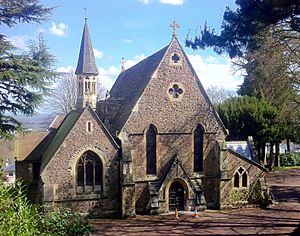Holy Trinity Church, Malvern Link facts for kids
The Church of the Holy Trinity is a beautiful Anglican church located in North Malvern, Worcestershire, England. It was built a long time ago, between 1850 and 1851. People donated money to help build it. A famous architect from the Victorian era, Samuel Daukes, designed the church. Over the years, more parts were added, from 1872 to 1909. In 2008, it was recognized as a special historical building with a Grade II heritage listing. Today, Holy Trinity Church is still an active church where people worship.
Quick facts for kids Holy Trinity Church |
|
|---|---|

Holy Trinity Church, North Malvern
|
|
| 52°07′12″N 2°19′49″W / 52.119945°N 2.330215°W | |
| Location | North Malvern, Worcestershire |
| Country | United Kingdom |
| Denomination | Anglican |
| Website | http://www.holytrinitymalvern.org.uk |
| History | |
| Consecrated | 9 September 1851 |
| Architecture | |
| Functional status | Active |
| Heritage designation | Grade II Listed |
| Designated | 3 April 2008 |
| Architect(s) | Samuel Daukes |
| Years built | 1850-51, 1872, 1896-7, 1908-9 |
| Administration | |
| Parish | The Holy Trinity, Great Malvern |
| Deanery | Malvern |
| Archdeaconry | Worcester |
| Diocese | Worcester |
Contents
History of the Church
Building a New Church
In the 1800s, the town of Malvern grew a lot. More people lived in North Malvern. They needed a church closer to their homes. So, in 1841, a special fund was started. People were asked to donate money to build a new church.
Donations and Design
Many people helped by giving money. Charles Morris donated £2000, and Lady Emily Foley gave £1000. Other people gave £800. Church societies also helped. The Diocesan Church Building Society gave £300. The Incorporated Church Building Society added another £225. In total, about £3,500 was raised for the building.
The church was designed by an architect named Samuel Daukes. He was part of a group called the Ecclesiological Society. This group had ideas about how churches should look inside. For example, the altar area, called the chancel, is raised and decorated. It is a few steps higher than the main seating area, known as the nave.
Church Additions and Recognition
The church became bigger in 1872. George and Henry Haddon added a north aisle. This new part was officially opened on July 17, 1873. Later, in 1897, a vestry and dormer windows were added to the nave.
In 2008, the Church of the Holy Trinity received a special honor. It was given a Grade II heritage listing. This means it is an important historical building. The church is still used for worship today as part of the Church of England.

